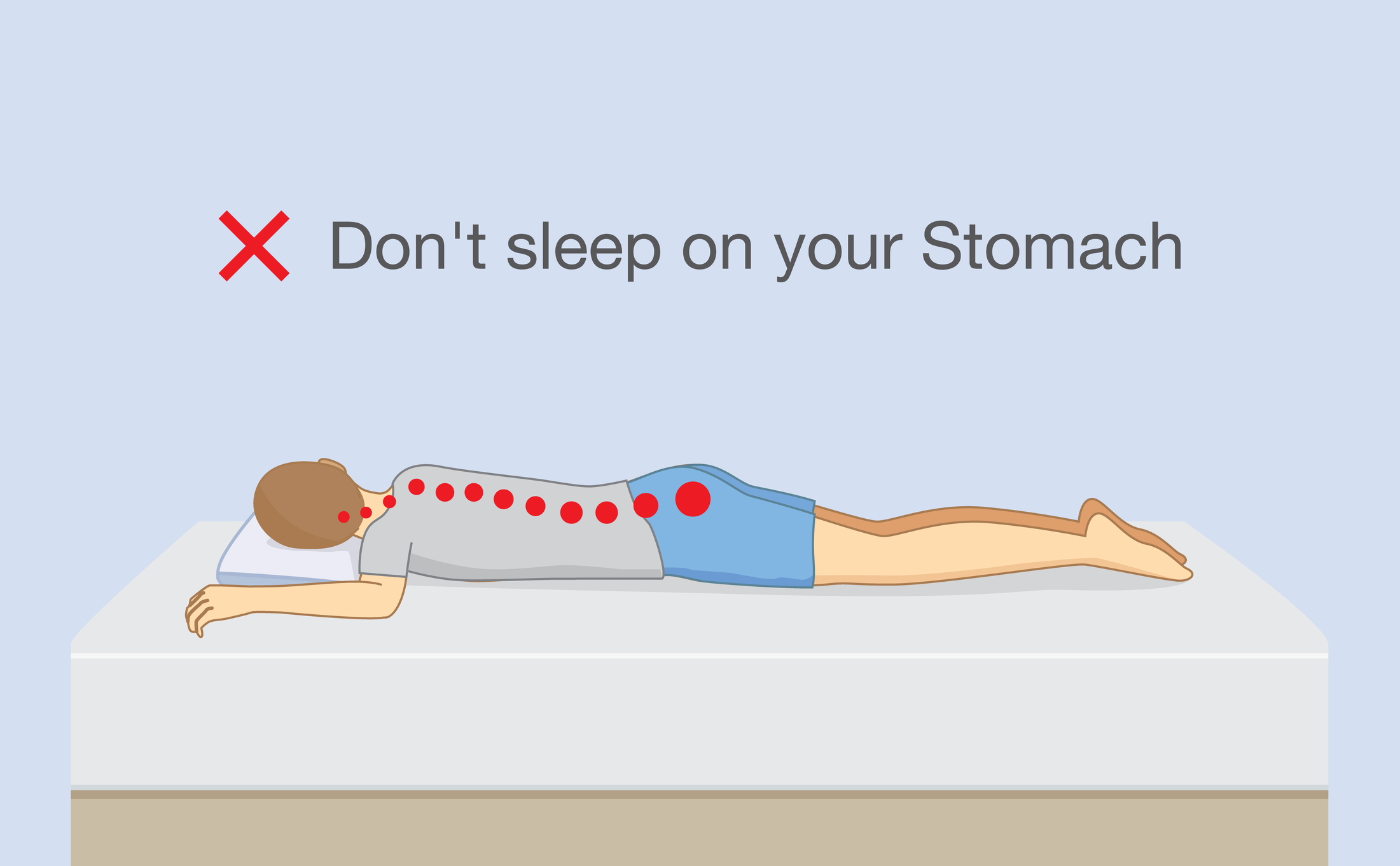Sleeping is important to your health, yet how you sleep is as important as how long you sleep. Some like to sleep on their backs, others enjoy sleeping on their sides, and others like snoozing on their stomachs. Although it may be comfortable, sleeping on your stomach can create issues with your back, neck, and overall well-being.
It’s regarded by many as the least healthy sleeping position. It’s hard on the neck, stresses the spine, and even compromises breathing. With repeated strain, these issues can create ongoing pain, poor posture, and poor quality of sleep. It may also cause some people skin irritation, headaches, or joint pain.
If you are a stomach sleeper, knowing its impact can assist you in making improved sleeping decisions and overall well-being.
Therefore, this article will examine the impact of sleeping on your stomach and explain how it can affect different body parts.
Neck Strain
One of the first areas affected by stomach sleeping is the neck. When you sleep on your stomach, you need to turn your head to the side to be able to breathe. Although sleeping on your stomach may feel natural at first, it keeps your neck twisted for many hours. Due to this, your neck muscles, joints, and ligaments remain under pressure during sleep.
Consequently, stomach sleepers tend to wake with a stiff or sore neck. Some will even wake up with a headache in the morning due to the tension accumulated overnight. At the outset, the pain may be minimal, yet as the habit continues, it may result in long-term neck aches as well as chronic tightness.
With time, your neck can become less flexible, restricting ease of movement during the day. Your spine’s overall functions, as well as your overall posture, can also be influenced by poor neck alignment.
If you’ve ever asked, Is it bad to sleep on your stomach? The answer is yes. The key reason why experts recommend changing your sleeping position is the strain on your neck.
Back Pain
Another key issue with stomach sleeping is back pain. Your spine naturally has a curvature that supports and maintains your body in alignment. Stomach sleeping, however, disrupts this natural curvature. Rather than remaining relaxed and in its normal shape, your spine will flatten down on the bed.
This new alignment causes additional strain on your lower back. Consequently, your joints, as well as your muscles, can stiffen at night. It may cause soreness, tightness, or stinging pain in the morning. Most stomach sleepers describe being stiff or sore in the morning or during the daytime.
Additionally, your back muscles have to work overtime to stabilize your body. They remain engaged a little during the night rather than completely relaxing. This keeps them from receiving the rest they need to repair and recover.
Breathing Problems
Breathing well during sleep is just as important as getting enough rest. Lying on your stomach, however, compresses your chest onto the bed. This compression makes it more difficult for your lungs to open as you inhale and exhale completely.
Because of this, your breathing can become shallow during the night. This means your body doesn’t require as much oxygen as it requires. Even if you sleep for several hours, you may wake in the morning feeling exhausted, drowsy, or not refreshed. It’s as if your body slept through the motions but didn’t get the optimum benefit.
Also, this can be particularly challenging for those who have breathing disorders such as asthma or sleep apnea. For them, sleeping on their stomach can exacerbate issues by restricting flow further and making breathing even harder.
Skin and Facial Pressure
Sleeping on your stomach also has negative impacts on your muscles and joints. It can also affect your skin. Pressing your face into a pillow for hours, day in and day out, causes constant pressure and friction on your skin.
This rubbing can cause several skin ailments in the long run. It can result in premature formation of wrinkles on the forehead and cheeks. The same area of the face folds and creases every night, and that incessant rubbing can leave a lasting effect.
Besides, sleeping with your pillow close to your face may irritate your skin or cause acne. Pillowcases trap oils, dirt, and bacteria on your face and hair. When your skin comes in contact with them, they can block pores and cause acne or inflammation. It can get worse for those with sensitive skin or acne-prone skin.
Nerve Pain and Tingling
Lying on your stomach for extended periods can put additional pressure on your body parts—particularly your arms, shoulders, and legs. When pressure builds up, it can compress the nerves passing through those regions.
Consequently, you may wake with tingling, numbness, or that “pins and needles” sensation. These occur because the nerves are compressed and can’t send signals. Although this may pass soon after you move, it signals your body is stressed at night.
If this goes on night after night, it can cause more than tingling. It has the potential to cause persistent nerve pain and even muscle weakness. Some positions, particularly those twisting or bending the arms beneath the body, exacerbate this.
Final Thoughts
So, is sleeping on your stomach a bad habit? It may not feel like such a big deal, mainly if you are a speedy sleeper nestled comfortably. But this habit can result in long-term neck, back, and joint pain. It may even impact your breathing and the condition of your skin.
The positive here is that you don’t need to fix everything simultaneously. Experiment with a thinner pillow. Use a small pillow under your bottom to help support your back. Or gradually condition your body to sleep on your side.
Disclaimer
The content provided in this article, The Impact of Sleeping on Your Stomach: Is It Really That Bad?, is for informational purposes only and does not constitute medical advice. Open MedScience does not provide medical or health advice, diagnosis, or treatment. Always consult with a qualified healthcare professional or sleep specialist before making changes to your sleeping habits or addressing health concerns. Individual experiences may vary, and what may apply to one person may not apply to another. Open MedScience assumes no responsibility for any consequences arising from the use of the information in this article.




